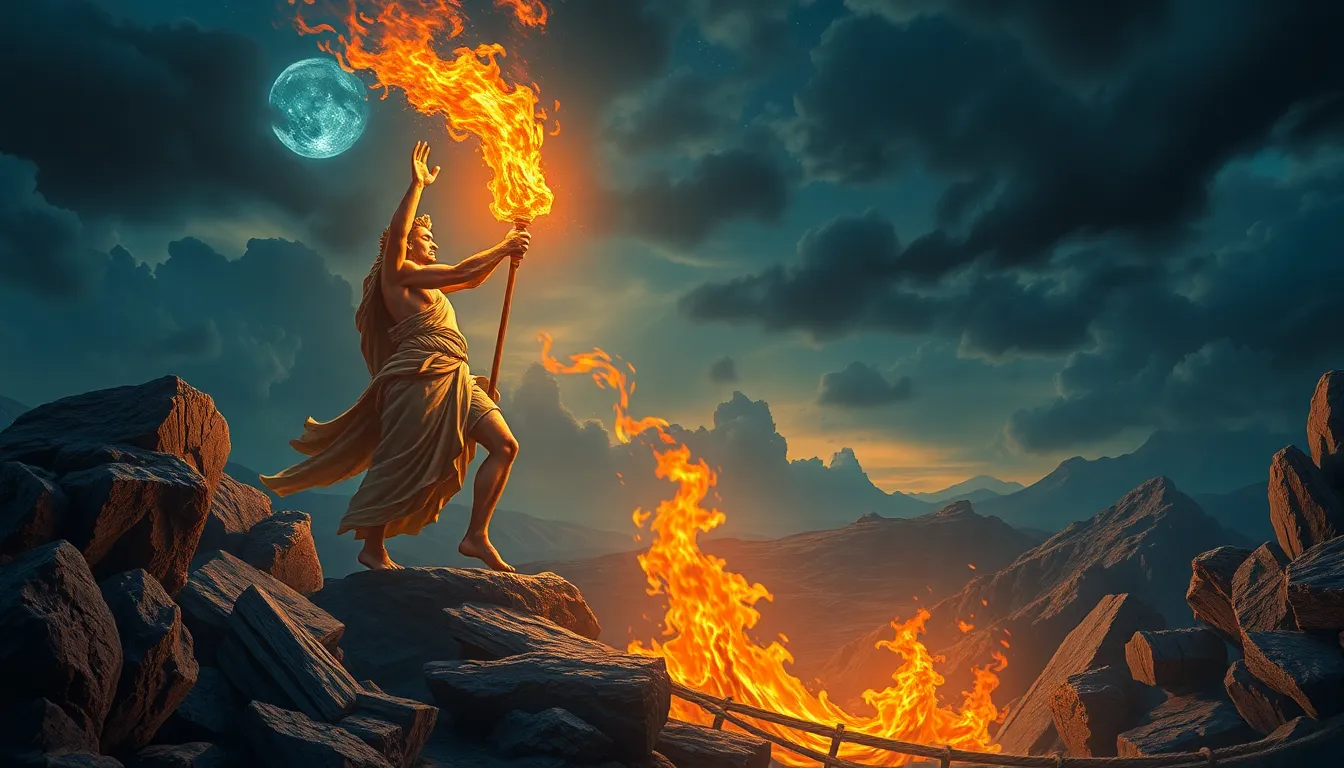Prometheus and the Fire of Knowledge: A Mythical Exploration
I. Introduction
Prometheus is one of the most compelling figures in Greek mythology, often seen as a symbol of rebellion and enlightenment. He is celebrated for his intelligence and cunning, traits that led him to defy the gods in pursuit of a greater good for humanity. The fire he stole from Zeus not only represented physical warmth and light but also the flame of knowledge and innovation.
Throughout history, fire has been a powerful symbol of enlightenment, representing the transformative power of knowledge. This article aims to delve into the myth of Prometheus, exploring its implications for knowledge and progress, as well as its relevance in contemporary society.
II. The Myth of Prometheus
The origins of Prometheus can be traced back to ancient Greek mythology, where he is often depicted as a Titan, a race of deities who predate the Olympian gods. Unlike many of his kin, Prometheus took a stand for humanity, choosing to assist rather than to oppress.
Prometheus is best known for his defiance against Zeus, the king of the gods. According to the myth, he stole fire from the heavens and gave it to mankind, an act that not only provided physical warmth and the ability to cook food but also ignited the spark of creativity and intellect among humans.
The consequences of this act were severe. Zeus, angered by Prometheus’ audacity, punished him by having him bound to a rock where an eagle would eat his liver daily. Each night, his liver would regenerate, leading to an eternal cycle of suffering. This punishment serves as a stark warning against defying divine authority.
III. Symbolism of Fire in the Myth
Fire, in the context of the Prometheus myth, is a multifaceted symbol. It represents:
- Knowledge and Innovation: Fire is a catalyst for progress, enabling advancements in technology and culture.
- Creation and Destruction: While fire can lead to creation (cooking, crafting), it can also result in destruction (wildfires, war).
Other myths featuring fire as a transformative element include the story of the phoenix, which rises from its ashes, symbolizing rebirth and renewal. In the myth of Hephaestus, the god of fire and craftsmanship, fire is a tool for creation, representing the productive power of knowledge.
IV. The Relationship Between Knowledge and Power
Prometheus’ gift of fire to humanity had profound implications. It allowed humans to rise from their primitive state, fostering civilization, culture, and the arts. However, this act also created a tension between knowledge and authority:
- Knowledge as Empowerment: The fire gave humanity the tools to challenge the status quo and seek their own destiny.
- Authority’s Response: The gods, particularly Zeus, viewed this enlightenment as a threat to their power and control.
Historically, knowledge has often challenged power structures, from the Enlightenment challenging monarchies to the rise of technology disrupting traditional industries. Prometheus embodies this struggle between the thirst for knowledge and the resistance from those in power.
V. The Consequences of Defying the Divine
Prometheus’ punishment serves as a cautionary tale. His eternal suffering illustrates the potential consequences of defying the divine in pursuit of knowledge. The themes of sacrifice and suffering resonate deeply:
- Sacrifice for Progress: Prometheus willingly endured torture to benefit humanity, highlighting the ethical dilemmas faced by innovators.
- Suffering as a Consequence: The myth serves as a reminder that the quest for knowledge can come at a high personal cost.
In contemporary discussions, Prometheus is often referenced in the context of ethics in science and technology, raising questions about the responsibilities that accompany innovation.
VI. Prometheus in Modern Culture
Prometheus has inspired countless literary and artistic representations throughout history. His story has been reinterpreted in various forms:
- Literature: Mary Shelley’s “Frankenstein” draws parallels between Prometheus and the responsibilities of creators.
- Art: Numerous artists have depicted the moment of Prometheus’ punishment, emphasizing themes of resilience and rebellion.
- Film and Media: Modern films often reference Prometheus in narratives that explore the consequences of scientific advancement, such as “Blade Runner” and “Prometheus” (2012).
These representations highlight the enduring legacy of Prometheus in contemporary discourse on knowledge and its implications for society.
VII. Lessons from the Prometheus Myth
The myth of Prometheus offers vital lessons regarding the responsibilities that accompany knowledge:
- Responsibility: With great power comes great responsibility; those who seek knowledge must consider its impact on society.
- Ethical Considerations: Innovation should be pursued with caution, ensuring that ethical implications are thoroughly examined.
- Critical Thinking: The myth encourages questioning authority and thinking independently, a necessity in a rapidly changing world.
VIII. Conclusion
In exploring the myth of Prometheus, we uncover a narrative that is rich with meaning and relevance. The story emphasizes the transformative power of knowledge while cautioning against the consequences of defying authority. Prometheus’ enduring legacy serves as a reminder of the delicate balance between innovation and ethics.
As we navigate the complexities of modern society, embracing the spirit of Prometheus — a spirit of inquiry, rebellion, and responsibility — can inspire a more thoughtful approach to knowledge and progress.




